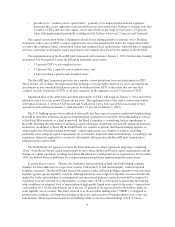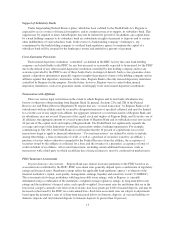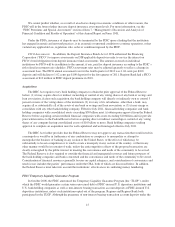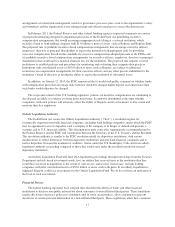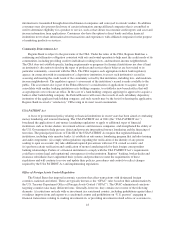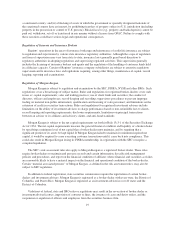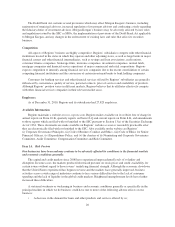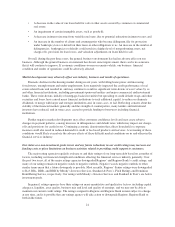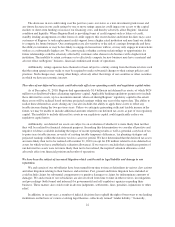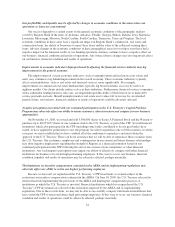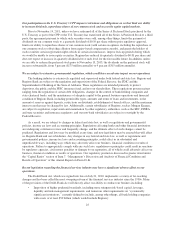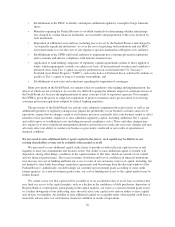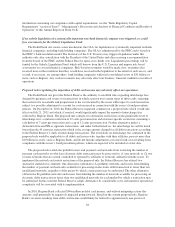Regions Bank 2010 Annual Report Download - page 32
Download and view the complete annual report
Please find page 32 of the 2010 Regions Bank annual report below. You can navigate through the pages in the report by either clicking on the pages listed below, or by using the keyword search tool below to find specific information within the annual report.information is transmitted through diversified financial companies and conveyed to outside vendors. In addition,
consumers may also prevent disclosure of certain information among affiliated companies that is assembled or
used to determine eligibility for a product or service, such as that shown on consumer credit reports and asset and
income information from applications. Consumers also have the option to direct banks and other financial
institutions not to share information about transactions and experiences with affiliated companies for the purpose
of marketing products or services.
Community Reinvestment Act
Regions Bank is subject to the provisions of the CRA. Under the terms of the CRA, Regions Bank has a
continuing and affirmative obligation consistent with safe and sound operation to help meet the credit needs of its
communities, including providing credit to individuals residing in low- and moderate-income neighborhoods.
The CRA does not establish specific lending requirements or programs for financial institutions nor does it limit
an institution’s discretion to develop the types of products and services that it believes are best suited to its
particular community, consistent with the CRA. The CRA requires each appropriate federal bank regulatory
agency, in connection with its examination of a depository institution, to assess such institution’s record in
assessing and meeting the credit needs of the community served by that institution, including low- and moderate-
income neighborhoods. The regulatory agency’s assessment of the institution’s record is made available to the
public. The assessment also is part of the Federal Reserve’s consideration of applications to acquire, merge or
consolidate with another banking institution or its holding company, to establish a new branch office that will
accept deposits or to relocate an office. In the case of a bank holding company applying for approval to acquire a
bank or other bank holding company, the Federal Reserve will assess the records of each subsidiary depository
institution of the applicant bank holding company, and such records may be the basis for denying the application.
Regions Bank received a “satisfactory” CRA rating in its most recent examination.
USA PATRIOT Act
A focus of governmental policy relating to financial institutions in recent years has been aimed at combating
money laundering and terrorist financing. The USA PATRIOT Act of 2001 (the “USA PATRIOT Act”)
broadened the application of anti-money laundering regulations to apply to additional types of financial
institutions such as broker-dealers, investment advisors and insurance companies, and strengthened the ability of
the U.S. Government to help prevent, detect and prosecute international money laundering and the financing of
terrorism. The principal provisions of Title III of the USA PATRIOT Act require that regulated financial
institutions, including state member banks: (i) establish an anti-money laundering program that includes training
and audit components; (ii) comply with regulations regarding the verification of the identity of any person
seeking to open an account; (iii) take additional required precautions with non-U.S. owned accounts; and
(iv) perform certain verification and certification of money laundering risk for their foreign correspondent
banking relationships. Failure of a financial institution to comply with the USA PATRIOT Act’s requirements
could have serious legal and reputational consequences for the institution. Regions’ banking, broker-dealer and
insurance subsidiaries have augmented their systems and procedures to meet the requirements of these
regulations and will continue to revise and update their policies, procedures and controls to reflect changes
required by the USA PATRIOT Act and implementing regulations.
Office of Foreign Assets Control Regulation
The United States has imposed economic sanctions that affect transactions with designated foreign
countries, nationals and others. These are typically known as the “OFAC” rules based on their administration by
the U.S. Treasury Department Office of Foreign Assets Control (“OFAC”). The OFAC-administered sanctions
targeting countries take many different forms. Generally, however, they contain one or more of the following
elements: (i) restrictions on trade with or investment in a sanctioned country, including prohibitions against direct
or indirect imports from and exports to a sanctioned country and prohibitions on “U.S. persons” engaging in
financial transactions relating to, making investments in, or providing investment-related advice or assistance to,
18



